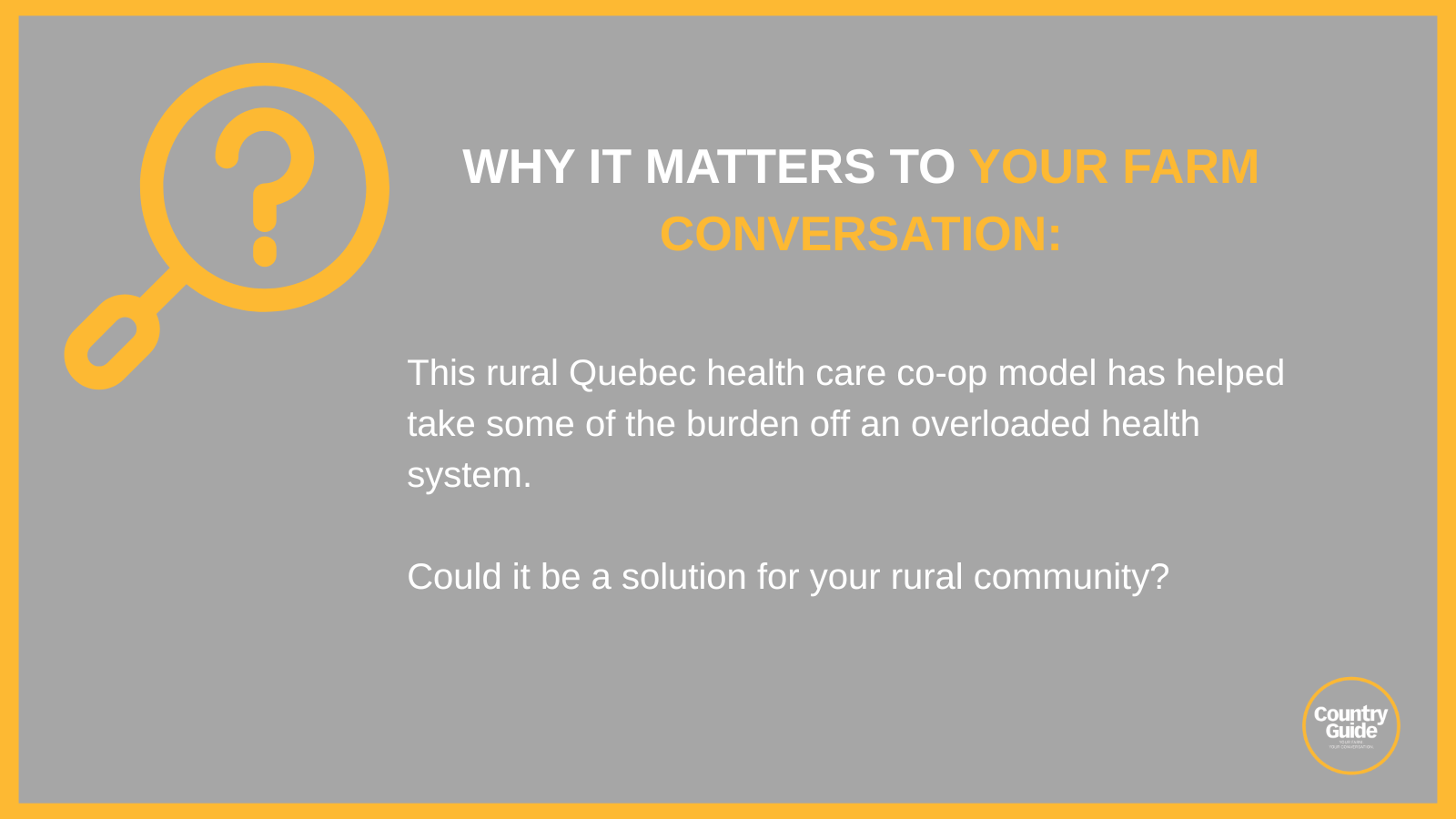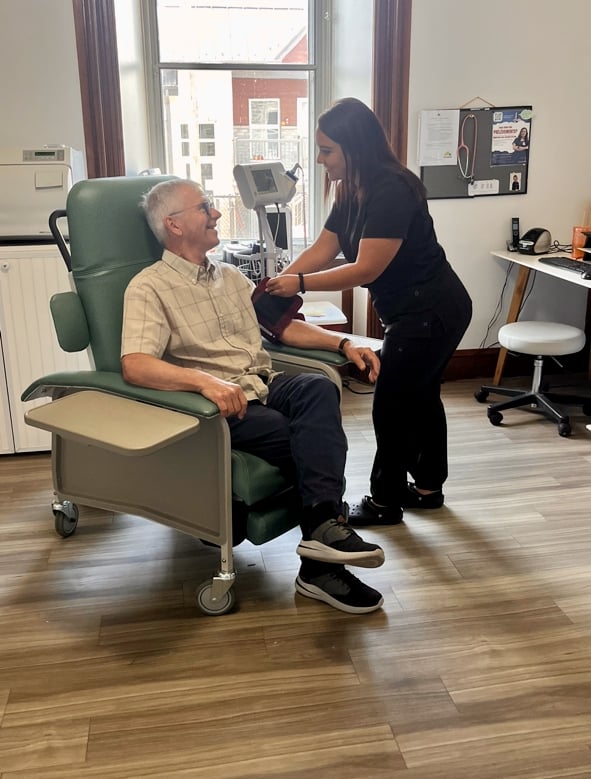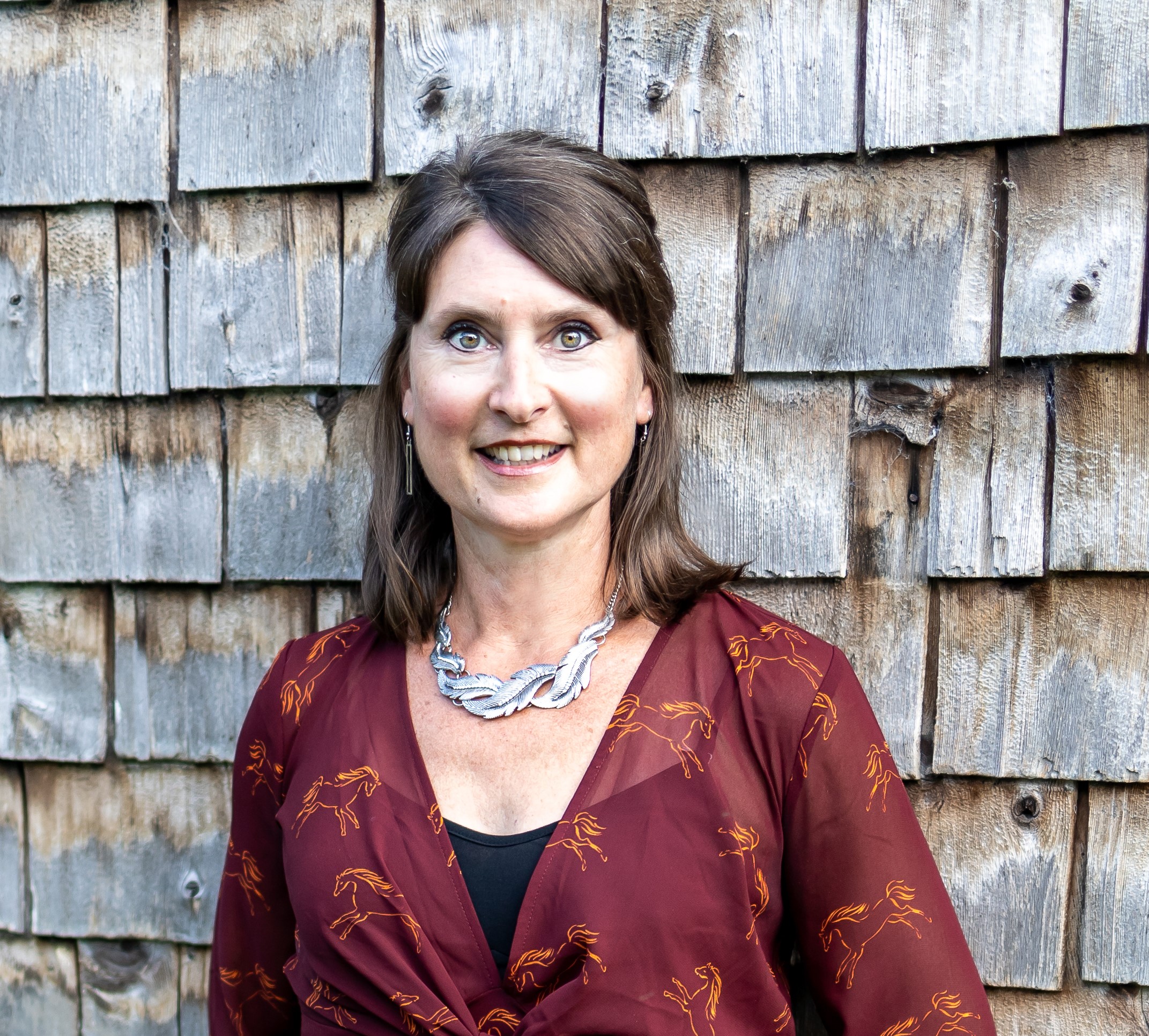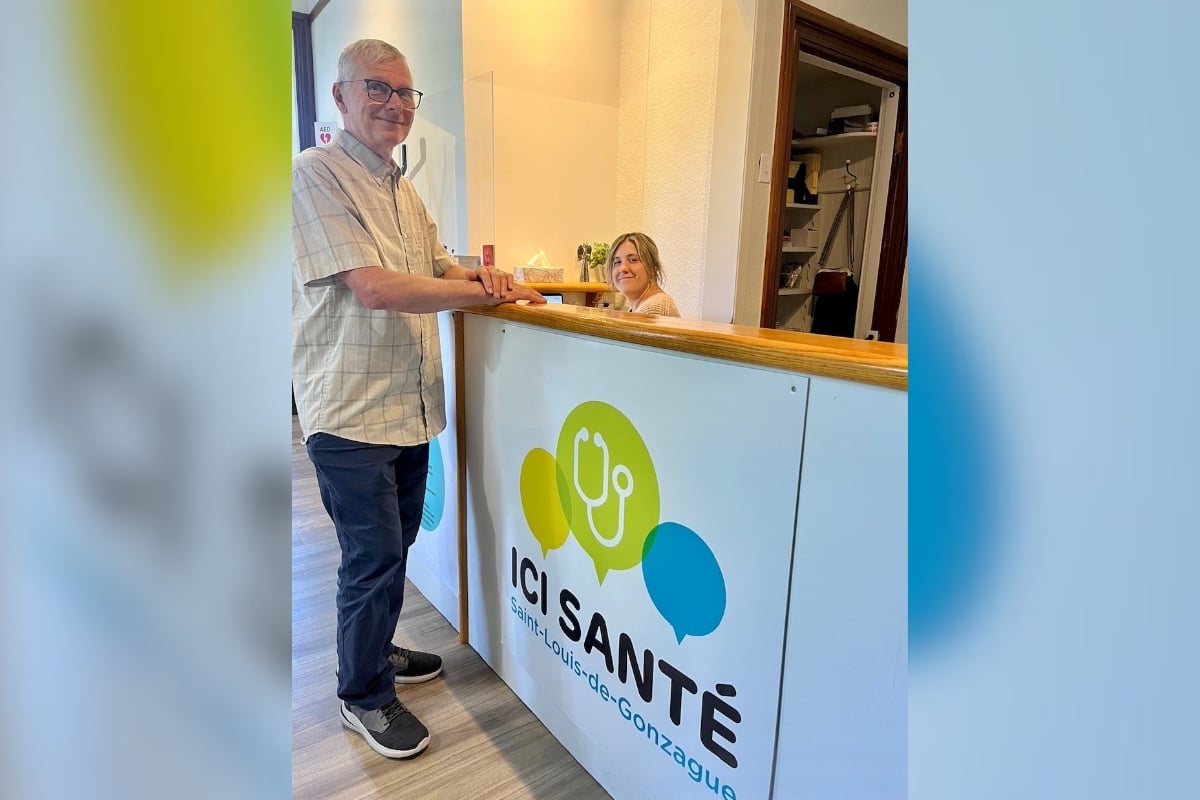Canada’s health care system is… well, I’m not sure what an appropriately diplomatic word would be to describe it. Let’s just say, it needs some serious work.
Quebec is no exception.
The answer in many rural parts of the province is health co-operatives.
Read Also

Farm & Family – Feb 27 edition
Last week, we highlighted part one of a two-part series by GFM associate digital editor Geralyn Wichers about why you…
The model was designed to relieve the overtaxed provincial health care system by meeting several first-line needs. But it hasn’t been — and still isn’t — an easy go.
I spoke with Amy Goodall-Tolhurst, founder of the Ici Santé health co-op, and Robert Brault, board president of the Co-op Ici Santé, about how this model of health care came into existence, how the co-op works and the services — and hope — it offers rural residents.

The beginning
As far back as 1998 Goodall-Tolhurst had been working with a health care program started through Howick United Church in Howick, Que., called parish nursing.
But as demand for health care in the region was getting larger due to an aging and growing population, “We got to a point after 10 years where the service needed to grow,” she recalls.
“We needed to offer more hours but as is often the case, we didn’t have enough money to cover the demand.”
While Goodall-Tolhurst was spending 16 hours a month on parish nursing, she also took a part-time job at a private medical clinic in Châteauguay, Que., about a half hour away. This type of health care setting provided insight on how that type of organization worked and what the challenges and expectations were.
“I said, okay, we need to try and combine something here, because people need the services. Some are willing to pay and for some it can be covered by their insurance. How do we make it all happen?”

In the early 2000s, she explored the model of health co-ops in surrounding municipalities to learn about how it might be applied in her region.
In 2012, the municipality of Howick conducted a study as part of its municipal family policy to explore how they could better support seniors and families. Subsequently, the embryonic Howick health co-op set up a meeting with local businesspeople, mayors and the local representative for Quebec’s national assembly, who was a major champion of the initiative. They set up a provisional committee and met every two weeks for two years. The committee also travelled around the province to learn from various established co-ops.
“We follow the standard model for health co-op development established by the regional co-op development organization, but you really have to adapt to where you live and what the needs are,” she says.
The structure
The Co-op Ici Santé (loosely translated as “health here”, meaning health care customized for the region) operates from two service centres (Saint-Louis-de-Gonzague and Howick) and counts 2,000 members.
Quebec health co-ops are grouped under the Fédération québécoise des coopératives de santé (Quebec Federation of Health Co-operatives). The FQCS has existed since 2018, and its 40 co-operative members are focused on filling the unmet needs of rural health services through preventative and curative first-line health care.
The provincial group of co-ops is made up of approximately 350 doctors and nurses and dozens of health professionals with expertise in physical and mental health.
To receive care at Ici Santé a patient is required to pay a one-time member fee of $10 which gets them a share in the co-op for life.
The patient is also supposed to pay an annual fee of $125. “This is where we need to adapt to our clientele,” says Goodall-Tolhurst. “Paying an annual fee enables the co-op to have an operating budget, but it has required a lot of persistence to get people on board with this. Those with fewer health issues interpret this fee as an expensive blood test. Well, maybe it is, but these are building blocks for the future of the co-op.”
Brault adds, “If you offer a service you have to hire the personnel regardless, whether there are two people or 10 who show up. That’s the reason for membership: it’s like an insurance. It costs $125 and maybe today you just need a blood test, but maybe tomorrow morning you might need a nurse to visit you at home. So, they have to understand that we have to hire that nurse and pay her no matter what.”
Goodall-Tolhurst says that the board chose to develop services progressively and carefully because “we cannot commit to things that we cannot do.”
Currently, she says the two big areas of health care that need to be addressed in the region are with young families and senior citizens. “Generally, everybody in between can cope with an emergency room or take action to improve the issue. They might not need it seen to immediately, as long as they can still function.
“It’s the parents who aren’t getting any sleep at night because their kid is crying, and it’s the seniors whose families become anxious because they’re worried or unable to be present for their parents. We want to support our seniors in their homes and accompany our young people as they navigate their roles as parents.”
She says the fit also has to work for health professionals. “Each professional has different strengths which brings a rounded dynamic to the team. And people raised in a rural setting often identify with the challenges of access to health care. For example, there was a nurse who felt she didn’t fit in an urban setting because she valued the rural life she grew up in and so she made the move to one of our co-ops.”
The benefits
Many local doctors refer their patients to the Co-op Ici Santé because a patient will get an appointment quicker than in the public system.
“Some doctors will call and say, ‘Listen, I’ve got an emergency here. I need to have this done right now.’ We will do our best to help the doctor get the patient taken care of,” says Goodall-Tolhurst.
Doctors who work in Quebec’s relatively newly established Groupes de médecine de famille (family medicine groups) enjoy what that organizational structure offers. By grouping together, administrative tasks are taken care of for them by government allocation. However, there are also obligations with this structure.
“Our approach is similar,” says Goodall-Tolhurst. “We aim to take the burden of administration and bureaucracy off the doctors’ backs so that they can do what they do best: provide care.”
Services offered at the Co-op Ici Santé consist of everything from blood samples to foot care; vaccinations to ECGs; tick, stitches and bandage removal; cryotherapy and much more.
A local resident can call the co-op one day and usually have an appointment the next.
One of their most important services is consultation. “The public system is difficult to navigate. If patients come to us with something we cannot address then we’ll work through their options to help them make the best decision,” says Goodall-Tolhurst.
The future
Goodall-Tolhurst, who has occupied all roles within the co-op — board of directors, administration, nurse, resource person — now occupies more of “a position with a title” rather than an active role because she sits on the federal board of co-operatives. She brings information from the provincial level back to the local co-op and feeds federal and provincial governing bodies information about what’s happening locally on the ground, such as what needs are required and where.
The biggest challenge is funding.
This is where Goodall-Tolhurst says they fall through the cracks. “We’re not a charitable organization, we’re a not-for-profit co-op. This combination excludes us from many grant opportunities. Historically, community investment is how our entire province’s health care system started: little villages encouraged people to sign on as members to build their hospitals. Businesses were solicited for donations. But currently, people are stretched very thin in terms of what they can afford.”
Brault says he knows that complementary services like theirs are helping to take the burden off the “big” health care system. “There’s 900,000 people on a waiting list to see a specialist in Quebec. So, there’s a place for complementary services.
“While we’re not able to offer all the services of a hospital, we can offer followups so that someone doesn’t have to sit in an emergency room for 12 hours for, say, stitch removal,” he says.
Goodall-Tolhurst experienced firsthand how important access to a local health co-op can be. “We have been told on several occasions that one blood test saved a life. In our case, my husband was able to receive timely treatment for prostate cancer thanks to early detection with a PSA test and he is now cancer-free.
“My goal when starting Ici Santé was to ensure the type of care I want to receive when I’ll need it. A co-operative model enables the clinic to improve their team approach at a local level. Our rural health co-op prioritizes its members.”
















